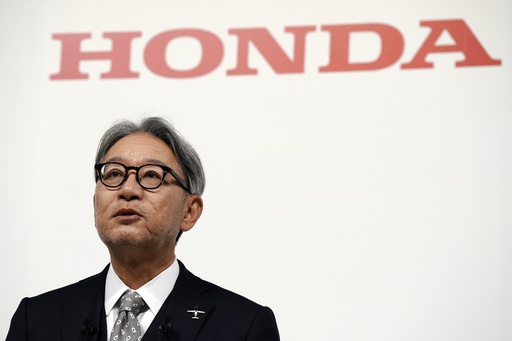
TOKYO — Major Japanese automobile manufacturers Honda, Nissan, and Mitsubishi have announced the cessation of their discussions regarding a potential business integration.
Nissan’s CEO, Makoto Uchida, revealed that the talks had shifted from establishing a joint holding company to the prospect of making Nissan a subsidiary of Honda. “The purpose was to collaborate and achieve success in the international market, but this approach would not allow Nissan to fully realize its capabilities, so I could not agree to it,” he stated during a press briefing. He confirmed that Nissan would now focus on recovery independently of Honda.
In a separate media session, Honda’s CEO, Toshihiro Mibe, expressed his disappointment over the outcome. He mentioned that Honda had proposed a stock swap to facilitate quicker decisions, underscoring the potential they believed existed in joining forces. “I truly feel let down. The possibilities were immense, but I was also aware that necessary painful actions needed to be taken to achieve those goals,” Mibe commented.
The automakers reached a mutual decision to terminate their collaboration discussions, as confirmed by a joint statement after board meetings at each company. In December, Honda and Nissan had declared their intention to negotiate the creation of a joint holding entity, which Mitsubishi also considered joining.
From the onset, industry experts had raised questions regarding the benefits of such a partnership, given the overlap in their vehicle models and capabilities, especially in an automotive landscape that has been disrupted by formidable entrants like Tesla and BYD, along with the shift towards electric vehicles.
Initially, Honda and Nissan had aimed to finalize their agreement by June, aspiring to establish the joint holding company by August. On Thursday, the three manufacturers affirmed their commitment to collaborate on electric vehicle development and smart car innovations, particularly in the realm of autonomous driving technologies.
In recent weeks, Japanese media outlets had circulated rumors about the breakdown of the discussions, quoting anonymous sources. Reports suggested that Nissan may have hesitated at the thought of becoming a subordinated entity within the collaboration.
Mibe refuted any claims regarding his knowledge of media speculation suggesting that Taiwan’s Foxconn was interested in acquiring a stake in Nissan. Uchida also denied having official discussions with Foxconn but highlighted that Nissan would consider various options as it seeks a turnaround, promising that a more comprehensive recovery strategy would be unveiled within the next month.
Financially, Honda is in a stronger position than Nissan, and it was expected to lead the proposed joint executive team. Recently, Honda reported a 7% decline in profits for the period between April and December 2024, amounting to 805 billion yen ($5 billion). Conversely, Nissan reported a loss for the July to September quarter due to a drop in vehicle sales, which resulted in the reduction of 9,000 jobs. Uchida took a significant pay cut of 50% during this period to take accountability for the company’s performance.
On Thursday, Nissan disclosed that its profits for the same period plummeted to 5.1 billion yen ($33 million) from 325 billion yen ($2.1 billion) the previous year and predicted losses of 80 billion yen ($519 million) for the full fiscal year ending in March.
When queried by the media about his potential resignation in light of Nissan’s poor results, Uchida indicated that he would be open to stepping down, but ultimately left the decision up to the board.
This recent split among the automakers highlights the challenges traditional automakers face in adapting to an increasingly competitive and evolving automotive market.

